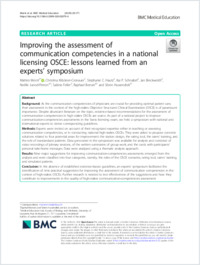Improving the assessment of communication competencies in a national licensing OSCE: lessons learned from an experts’ symposium
- Monti, Matteo Medical Education Unit, Faculty of Biology and Medicine, University of Lausanne, Rue du Bugnon 21, 1011 Lausanne, Switzerland
- Klöckner-Cronauer, Christina Medical Education Unit, Faculty of Biology and Medicine, University of Lausanne, Rue du Bugnon 21, 1011 Lausanne, Switzerland
- Hautz, Stephanie C. Institute of Medical Education, Department of Assessment and Evaluation, University of Bern, Bern, Switzerland
- Schnabel, Kai P. Institute of Medical Education, Department of Assessment and Evaluation, University of Bern, Bern, Switzerland
- Breckwoldt, Jan Student’s Deanery, Medical Faculty, University of Zürich, Zürich, Switzerland
- Junod-Perron, Noëlle Division of Primary Care, Geneva University Hospitals, Geneva, Switzerland - Unit of Development and Research in Medical Education, Faculty of Medicine, Geneva, Switzerland
- Feller, Sabine Institute of Medical Education, Department of Assessment and Evaluation, University of Bern, Bern, Switzerland
- Bonvin, Raphael Medical Education Unit, Faculty of Sciences and Medicine, University of Fribourg, Fribourg, Switzerland
- Huwendiek, Sören Institute of Medical Education, Department of Assessment and Evaluation, University of Bern, Bern, Switzerland
-
26.05.2020
Published in:
- BMC Medical Education. - 2020, vol. 20, no. 1, p. 171
English
Background: As the communication competencies of physicians are crucial for providing optimal patient care, their assessment in the context of the high-stakes Objective Structured Clinical Examination (OSCE) is of paramount importance. Despite abundant literature on the topic, evidence-based recommendations for the assessment of communication competencies in high stakes OSCEs are scarce. As part of a national project to improve communication-competencies assessments in the Swiss licensing exam, we held a symposium with national and international experts to derive corresponding guidelines.Methods: Experts were invited on account of their recognized expertise either in teaching or assessing communication competencies, or in conducting national high-stakes OSCEs. They were asked to propose concrete solutions related to four potential areas for improvement: the station design, the rating tool, the raters’ training, and the role of standardized patients. Data gene.rated in the symposium was available for analysis and consisted of video recordings of plenary sessions, of the written summaries of group work, and the cards with participants’ personal take-home messages. Data were analyzed using a thematic analysis approach.Results: Nine major suggestions for improving communication- competencies assessments emerged from the analysis and were classified into four categories, namely, the roles of the OSCE scenarios, rating tool, raters’ training, and simulated patients.Conclusion: In the absence of established evidence-based guidelines, an experts’ symposium facilitated the identification of nine practical suggestions for improving the assessment of communication competencies in the context of high-stakes OSCEs. Further research is needed to test effectiveness of the suggestions and how they contribute to improvements in the quality of high-stakes communication-competencies assessment.
- Faculty
- Faculté des sciences et de médecine
- Department
- Master en médecine
- Language
-
- English
- Classification
- Medicine
- License
- License undefined
- Identifiers
-
- RERO DOC 328641
- DOI 10.1186/s12909-020-02079-4
- Persistent URL
- https://folia.unifr.ch/unifr/documents/308746
Statistics
Document views: 65
File downloads:
- bon_iac.pdf: 132
